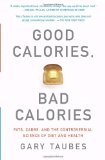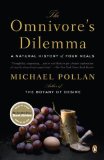
Do you want to lose weight or understand the causes of obesity? Are you interested in knowing which calories are good and which are bad? Do you want to know why the mainstream thinking on nutrition may be causing more obesity and other illnesses? Are dietary fat and cholesterol really causing obesity, heart disease, and other problems? What is the contradictory evidence, and why is it omitted? You might be surprised by the history, politics, personalities, and science (or lack-thereof) behind the current nutritional recommendations and by the possibility that the current “wisdom” on nutrition is wrong. This book is one of the most important books I’ve read in my life, and I couldn’t put it down.
I highly recommend Good Calories, Bad Calories: Fats, Carbs, and the Controversial Science of Diet and Health (Vintage), a well-written book, to help understand an alternative hypothesis of how certain types of foods cause Western diseases, such as obesity, heart disease, cancer, etc. Author Gary Taubes, a correspondent for Science magazine who is the only print journalist to have won three Science in Society Journalism awards, spent five years doing research for the book, and the research surprised even him. He writes, “the ongoing epidemic of obesity in America and elsewhere is not, as we are constantly told, due simply to a collective lack of will power and a failure to exercise. Rather it occurred … because the public health authorities told us unwittingly, but with the best of intentions, to eat precisely those foods that would make us fat, and we did.”
 Since I read The Omnivore’s Dilemma: A Natural History of Four Meals
Since I read The Omnivore’s Dilemma: A Natural History of Four Meals by Michael Pollan in April 2009, I’ve been refining my diet as I’ve learned more about food, nutrition, and disease. With Michael Pollan’s book, I made sweeping changes, throwing out the worst of the processed foods I was eating (like Yoplait yogurt and store brand cottage cheese), and replaced those products with healthier versions, like Dannon low-fat vanilla yogurt and Daisy brand cottage cheese, without the high-fructose corn syrup and nasty food additives. As I read more about food, I stopped buying almost all processed foods, including my favorites, like spaghetti sauce, salsa, and BBQ sauce, and made my own from scratch. Also, I’ve been refining my percentages of carbs, protein, and fat as I’ve been learning more.
However, there were questions that I’ve had since I’ve started doing my research, like how can the French eat high-fat foods and not have a high incidence of heart disease? How can the Inuit eat an all-meat diet with high amounts of fat and maintain their health? Why do studies on hunter-gatherer populations show that they eat much less carbohydrates than we do, and yet they are free of Western diseases? How can certain populations eat mostly a shrimp diet, which is high in dietary cholesterol, and yet not have heart disease? How did people come to recommend a 60% carb, 20% protein, and 20% fat diet (which I know is wrong for me)?
In fact, I was doing more research when I came upon a link to this book, which sounded like information that I was looking for to help cut through the confusing and sometimes overwhelming information on diet and nutrition. I really resonated with what the author was saying, and the book answered a great many of the questions about nutrition that I’ve had (all of the ones above and many more). In fact, for the past two weeks, I’ve made further refinements to my diet after reading this book.
The author begins the book with a prologue, “A Brief History of Banting,” which I found to be fascinating. Little did I realize that low-carb diets were, according to Taubes, the main method used to lose a lot of weight and treat diabetes for 140 years, starting in 1825 in France. He gives plenty of information about the French research.
He goes on to explain the aim of the book, which is to take a critical look at the question: What constitutes a healthy diet? To do so, he critically examines the research that led to the prevailing wisdom of nutrition and health and presents information that is not usually voiced publicly for reasons that he details via history and politics. Taubes writes, “Why this skepticism [that dietary fat and cholesterol cause heart disease] is rarely made public is a major theme of this book. In fact, skeptics have often been attacked or ignored, as if disloyal at time of war. Skepticism, however, cannot be removed from the scientific process. Science does not function without it.”
After the prologue, Taubes breaks the book into three parts: The Fat-Cholesterol Hypothesis, The Carbohydrate Hypothesis, and Obesity and the Regulation of Weight. Each part is broken into multiple chapters, providing fascinating history, maddening politics, and scientific research. At times, he shows why the research is flawed, or at least the conclusions drawn from the research are flawed. From my own readings of scientific experiments on nutrition, I had already come to the conclusion that most of the sweeping generalizations drawn from the experiments I reviewed were flawed, so I really resonated with the author’s thoughts in this area.
From his research on native populations to modern society, Taubs makes a great case that refined carbs and low-fat diets are a bane to our civilization. He goes on to explain the biological mechanisms in more layman’s terms for certain diseases. For example, he shows how insulin, which is present in great quantities after eating refined carbs, causes the body to store food as fat and may also promote other diseases, like Alzheimer’s. Also, he shows a link between a low-fat diet and cancer.
While I highly recommend this book, it isn’t for everyone. It is quite dense, and it’s not a diet book, although after Taubes did all the research, he actually did change his own diet and makes some recommendations of what to eat or not eat.
However, if you are looking for an understanding of why the current nutritional “wisdom” is wrong or looking for information that can help you lose weight, read this life-changing book. This is one of those books that I want to keep on my shelf for further reference.
Rating: ♥♥♥♥♥ (5 out of 5)